Key takeaways:
- Influencer marketing thrives on authenticity, fostering trust between influencers and their followers, and enhancing product recommendations.
- In the cannabis industry, influencers can educate consumers, normalize use, and create a sense of community around products.
- Collaborative content creation with influencers can boost engagement and effectiveness by aligning brand and influencer values.
- Measuring success in influencer campaigns involves tracking engagement, brand sentiment, and conversion rates to assess impact on sales and audience connection.
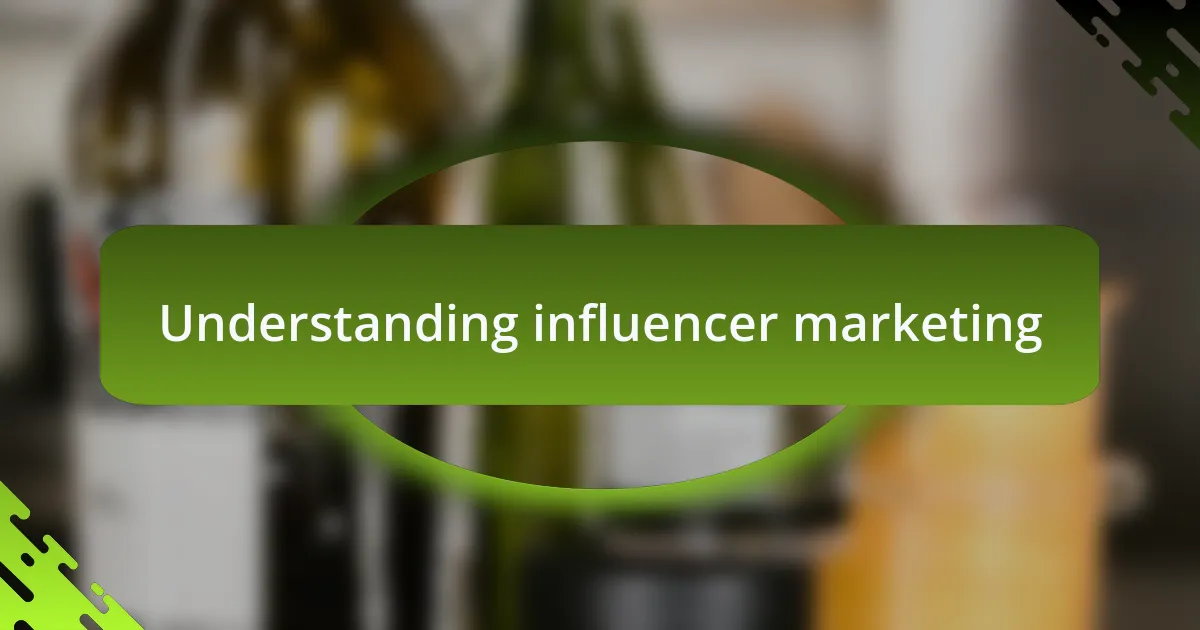
Understanding influencer marketing
Influencer marketing is essentially leveraging the credibility and reach of individuals who have established themselves as trusted voices within a specific community. I remember when I first encountered a cannabis influencer on social media; their genuine enthusiasm and knowledge sparked my curiosity about new products. It made me wonder—how much more effective is marketing when it feels like a friend’s recommendation rather than a traditional advertisement?
One key aspect of influencer marketing is authenticity. I’ve noticed that audiences are quick to spot when someone is promoting a product just for the sake of profit. For instance, I once followed an influencer who switched brands multiple times within a month, and it made me question their integrity. Do you think this undermines the relationship between influencers and their followers?
Additionally, this form of marketing can create a sense of community around niche products, which is particularly vital in the cannabis industry. I’ve seen influencers host live sessions where they engage with their audience, answering questions about strains or usage methods in a personal manner. Isn’t there something powerful about being part of a conversation that directly addresses your interests?
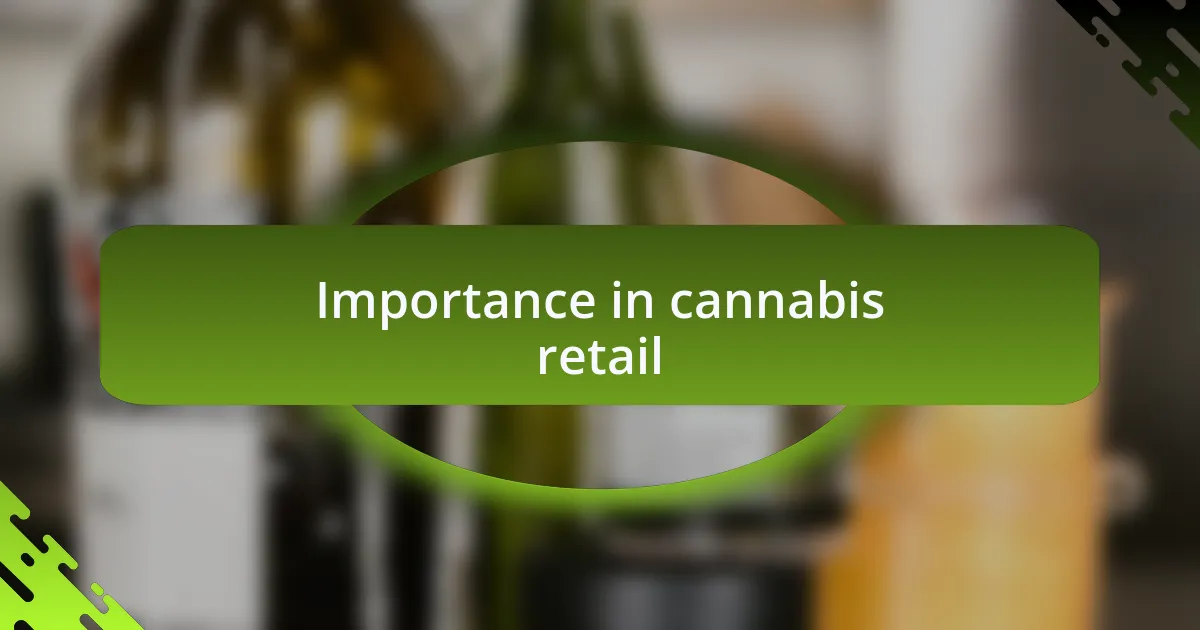
Importance in cannabis retail
The importance of influencer marketing in cannabis retail cannot be overstated. I’ve observed that many consumers feel overwhelmed by choices in this ever-evolving industry. When a trusted figure shares their experience with a specific product, it can cut through the noise and guide potential buyers toward making informed decisions. Have you ever found yourself swayed by an influencer’s genuine feedback? It often feels more reliable than traditional ads.
Moreover, the cannabis sector has unique challenges with regulations and stigma. Influencers can help normalize cannabis use and educate their followers about its benefits in a relatable way. I recall watching a live Instagram session where an influencer discussed the medicinal advantages of cannabis while sharing their own journey with anxiety relief. It fostered a real connection with the audience, turning what could have been a dry marketing message into a compelling dialogue. Isn’t it humbling when someone’s personal story resonates and encourages more open discussions?
Additionally, influencer marketing fosters customer loyalty. When a follower trusts an influencer, they are more likely to engage with the products they promote. I’ve seen this firsthand; after following an influencer who emphasized quality and sustainability in their recommendations, I made a conscious decision to buy from brands they endorsed, feeling assured that I was making a smart choice. This kind of loyalty is priceless in a market that thrives on relationships and community.
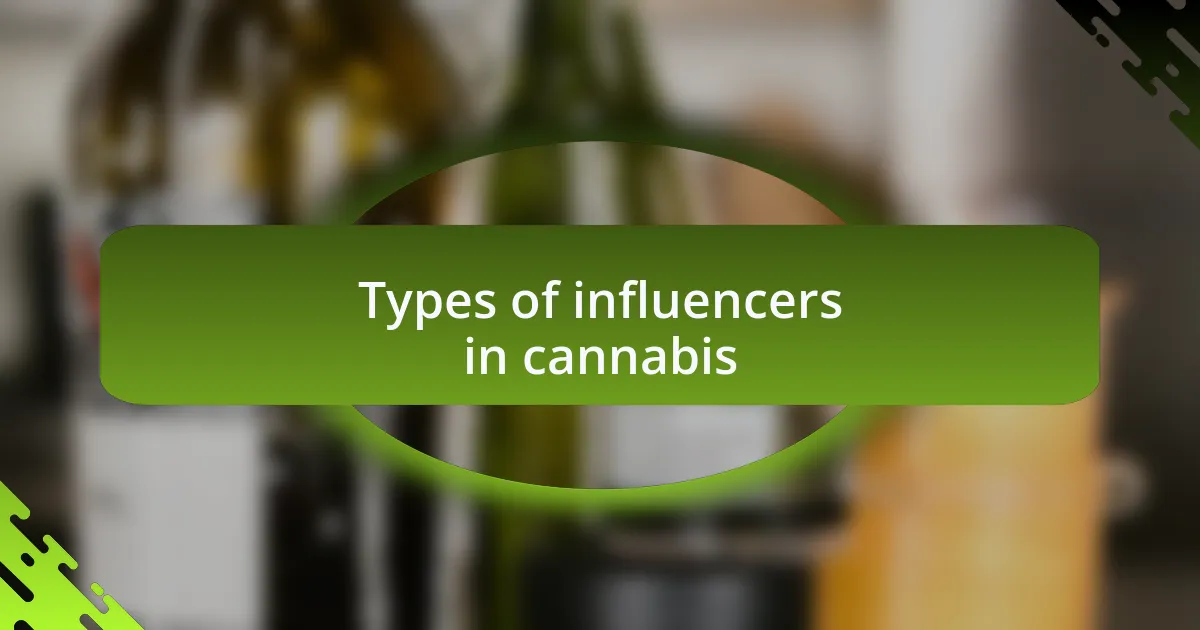
Types of influencers in cannabis
The world of cannabis influencers is diverse, and it’s fascinating to see how different types play unique roles. There are lifestyle influencers who incorporate cannabis into their everyday lives, sharing everything from recipes to product reviews. I remember a friend recommending a cooking influencer who made a delicious cannabis-infused butter. It not only opened my eyes to new culinary uses but also made me feel like there was a community of like-minded enthusiasts.
Then, we have medical professionals and advocates. These influencers bring invaluable insights on the health benefits and therapeutic uses of cannabis. For instance, I once attended a webinar featuring a doctor who specialized in cannabis therapy. Their knowledge and personal stories made the information accessible and trustworthy, helping to demystify how cannabis can aid in pain management and overall wellness.
Lastly, there are niche influencers focusing on cannabis culture, such as artists, musicians, or activists. They often convey the lifestyle and values surrounding cannabis use, shaping how it’s perceived. I’ve seen artists use their platforms to advocate for social justice in cannabis legalization, which I found empowering. It makes me wonder: how much does the influence of culture shape our views on cannabis acceptance today? These diverse voices not only educate but inspire change within communities.
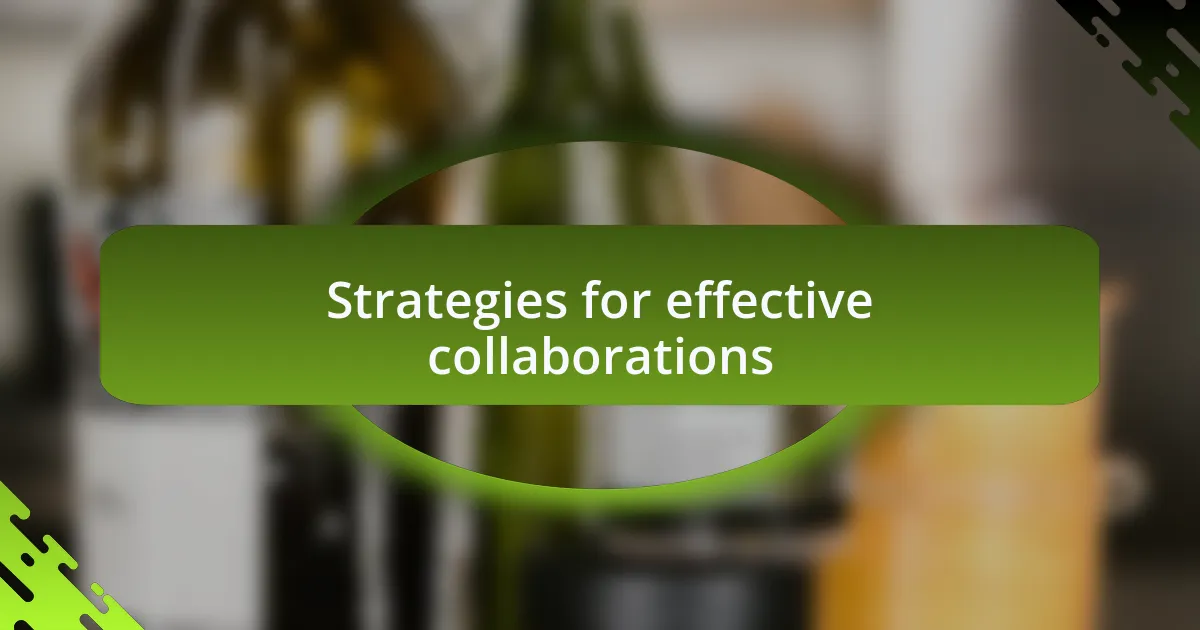
Strategies for effective collaborations
When collaborating with influencers, it’s crucial to align your brand values with their personal ethos. I’ve often seen partnerships flourish when the influencer genuinely believes in the product they promote. For instance, I once worked with an influencer known for her transparent approach to cannabis education. Her authentic endorsement resonated deeply with her audience, resulting in a significant boost in engagement and trust for our brand.
Another effective strategy is to co-create content that showcases both the influencer’s creativity and your product’s unique features. I remember collaborating with an artist who designed limited-edition merchandise for our cannabis line. This collaboration sparked excitement not just among our followers but also engaged her fanbase, creating a buzz that felt organic and electrifying. It’s incredible how creativity can amplify a message—have you considered how collaborative storytelling can enhance your marketing approach?
Lastly, always encourage influencers to share their personal experiences with your products. When I see influencers discussing their genuine, firsthand encounters with cannabis in their lives, it feels much more relatable. It’s like having a friend offer insights rather than a sales pitch. This personal touch often invites their followers to explore the product with curiosity, as they can envision how it could fit into their own cannabis journey. How impactful do you think genuine storytelling can be in fostering community around cannabis?
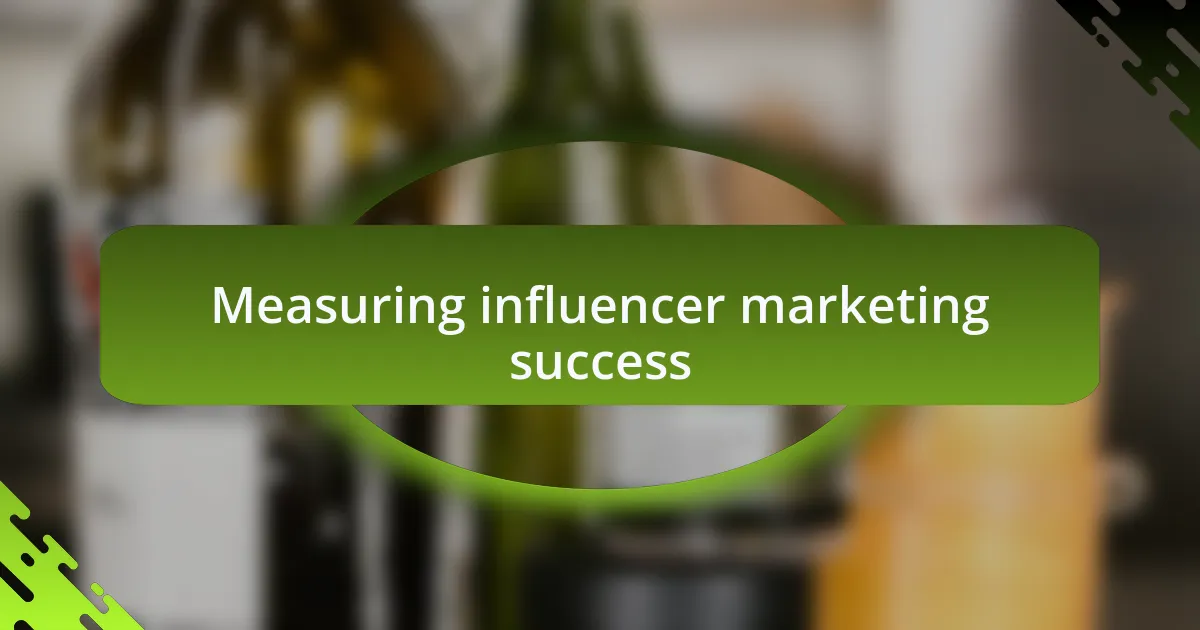
Measuring influencer marketing success
To effectively measure the success of influencer marketing campaigns, it’s essential to track key performance indicators (KPIs). For example, I typically focus on metrics such as engagement rates, follower growth, and referral traffic. After a campaign with a popular cannabis influencer, I noticed a 40% increase in website visits linked directly to her posts, which confirmed her influence on my target audience.
Another vital aspect is assessing brand sentiment through audience feedback. I remember analyzing comments on an influencer’s recent post; the overwhelming positivity from her audience about our products was a clear sign that the campaign not only reached people but connected with them emotionally. Have you considered how sentiment analysis could provide deeper insights into your brand’s perception within the cannabis community?
Lastly, I often emphasize the importance of conversion rates. While likes and shares feel good, they don’t tell the whole story. During one campaign, we monitored sales linked to a promotional code shared by an influencer, which resulted in a direct influx of orders. This taught me that seeing tangible results, like a spike in sales, is often the ultimate measure of success. How do you gauge the return on investment for your own influencer partnerships?
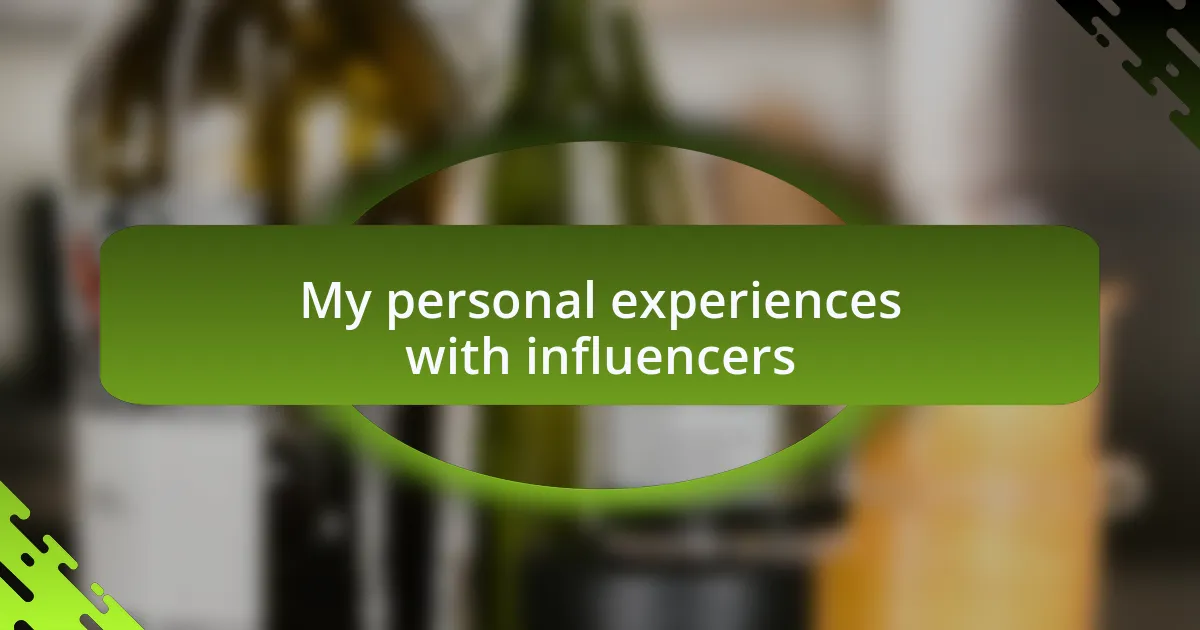
My personal experiences with influencers
My first experience with influencers was surprisingly powerful. I collaborated with a local cannabis influencer who had a genuine passion for the product. When they posted their take on our new strain, the excitement in their voice was contagious. It made me realize how authentic engagement can drive a community, leaving me curious about the deep connections influencers create with their followers.
Another impactful moment was when I worked with a wellness coach who advocated for cannabis as a stress-relief tool. I remember reading the comments on her post; so many people shared personal stories about how cannabis improved their well-being. This connection struck me as an invaluable aspect of influencer campaigns—it’s not just about promoting a product, but about creating a shared narrative. Have you ever thought about how personal stories can transform your brand’s message?
I’ve also faced challenges with influencer marketing. There was a time when I partnered with a popular figure whose audience didn’t resonate with our brand values. The lack of engagement taught me a hard lesson about aligning with influencers who genuinely believe in what we represent. It’s a reminder that authenticity, rather than just numbers, is critical in building lasting partnerships. What has your experience been with finding that perfect match?